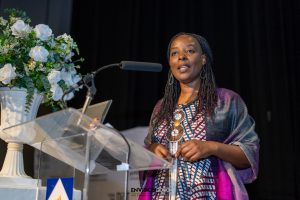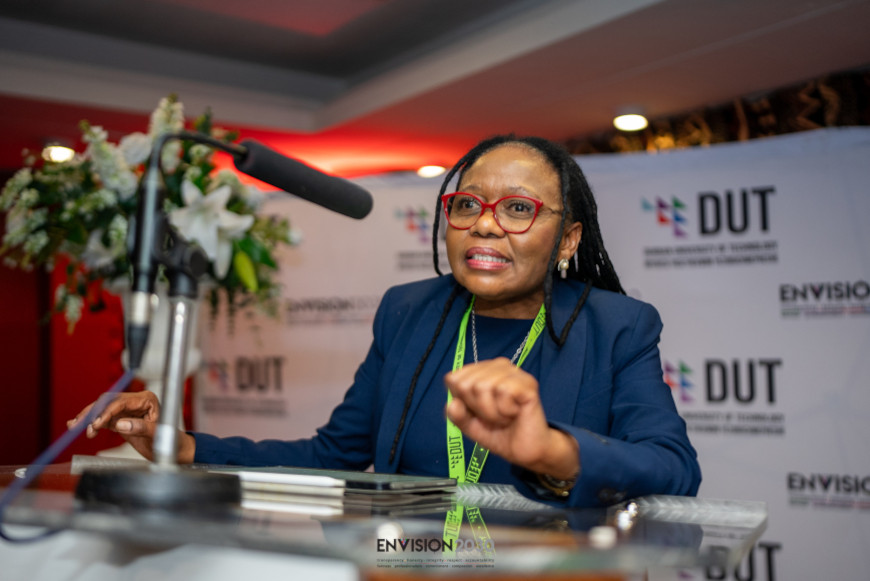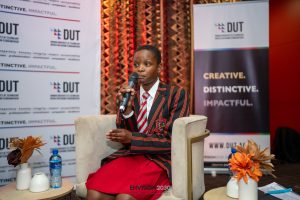As part of the Durban University of Technology (DUT) ENVISION2030 Dialogue Series, an inaugural workshop and launch of Women in Science, Technology, Engineering, Arts, Mathematics and Innovation (STEAMI)-DUT Chapter was unveiled at the Durban International Convention Centre on Wednesday, 19 July 2023.
The event was sponsored by the Department of Science and Innovation (DSI) and the Academy of Science of South Africa (ASSAf) to promote the International Year of Basic Science for Sustainable Development (IYBSSD)2022 with a specific focus on strengthening the presence and visibility of women in science. The event was hosted by the Office of the Acting Deputy Vice-Chancellor: Research, Innovation and Engagement, Professor Keolebogile Motaung and the Department of Chemistry in a bid to strengthen the presence and visibility of women in STEAMI at the DUT. Dr Pinkie Ntola from the Department of Chemistry was instrumental in conceptualising the project proposal for the sponsorship from the DSI/ASSAf.
The workshop aimed to address the Sustainable Development Goals (SDGs) of the United Nations with ‘Gender Equality’ and ‘Reduced Inequalities’ at its core. The programme encouraged women’s economic and social inclusion by providing them with resources to find gainful employment.
The programme director for the inaugural workshop was Acting Director for the Research and Postgraduate Support Directorate at the Durban University of Technology, Dr Vaneshree Govender.
Dr Govender indicated that the low number of women in academic careers is a major concern, especially in Science, Technology, Engineering, and Mathematics subjects. This was partly ascribed to the lack of visible role models for women in academia. Dr Govender indicated that the workshop had a host of female role models from academia and industry and how they overcame obstacles to reach the top of their careers.
Acting DVC: RIE, Prof Keo Motaung provided the rationale and purpose of the event. She indicated that the workshop was aligned with addressing the United Nations Sustainable Development Goal, the SDG to be targeted is Gender Equality And Reducing Inequality”. She further added that the line-up of speakers addressed and talked about many gender inequalities. She explained that the workshop included empowering women with sources of opportunity for productive employment and promoting the economic and social inclusion of women which is well aligned with the Academy of Science of South Africa (ASSAf) three-year-project titled: Eliminating Barriers to Women.
Prof Motaung indicated that the participation in science was one of the focus areas of the workshop where the challenges that female academics experienced in their education in reaching professional or executive management positions were shared. She expressed that the workshop also extended an invitation to women entrepreneurs, more specifically successful STEAMI women entrepreneurs in the country at large. Prof Motaung said “What we are trying to do is to see how we can even attract more women in STEAMI and to provide a platform for the presentation on women empowerment tools, strategies and ideas required for understanding and implementation of entrepreneurship and leadership”.
There were a wide array of speakers and one of the keynote speakers was Prof Sibusiso Moyo, Deputy Vice-Chancellor: Research, Innovation and Postgraduate Studies, Stellenbosch University.

Prof Sibusiso Moyo, Deputy Vice-Chancellor: Research, Innovation and Postgraduate Studies, Stellenbosch University.
She is also the former Deputy Vice-Chancellor: Research, Innovation and Engagement at DUT. Her topic of discussion focussed on leadership complexity and also how women can also create spaces to enable younger academics, younger staff to flourish and establish themselves as well as mentor others. She also made reference to her own story in her academic career.
Prof Moyo reflected on some takeaways which she thought were really critical in her career trajectory to leadership in the higher education landscape. She indicated the following:
“Some of the critical skills I think for me, which I have found and have collected from just my experiences over the last 22 years are in different scenarios is around the values. Values play a very significant role in terms of how you make your decisions and that’s about ethics integrity. I mean, really asking why you’re doing what you’re doing, respect for others despite what position they hold. You find a lot of people, they respect you because of the position you hold the moment you don’t have that position, the respect is gone and that is in itself for me when I talk about integrity, I’m not just talking about research compliance. It’s really understanding how you treat other humans as well, because for me that’s important. I really value that,” she said.
Prof Moyo also spoke about intercultural skills and emotional intelligence. She indicated: “So part of the struggle when you take up these positions, whether you are the head of department or DVC or Dean, is really how to deal with these different types of dynamics in your environment,” stressed Prof Moyo.
She also spoke about the importance of having mentors who are able to tell one when one is doing something wrong. Prof Moyo emphasised that when everyone talks, the question about science, technology innovation is a question of what each person is doing to contribute to education.
Prof Moyo indicated that the current population is SA is about 60 million people and in that about 51% of the population are female and 49% are male. She said that we need to train people in the technology areas where they can make and create new businesses and opportunities, to be able to succeed in addressing our economic challenges. Prof Moyo ended her presentation by saying that one must see opportunities everywhere, even in a bad situation, even when people are mean to one, just see what is the green light, what is the opportunity, work hard but work smart.
The next keynote speaker was Prof Cheryl Potgieter, Head Genderjustice, Health and Human Development and Head Research and Doctoral Leadership Academy ( RADLA). Prof Potgieter is another amazing woman leader in higher education . She explained that there needs to be training on gender justice for each and every academic, worker and student at a university.
Ms Mmampei Chaba, the Chief Director responsible for Multilateral and Africa engagements within Department of Science and Innovation (DSI) was another dynamic speaker for the day’s event. She focused on the DSI’s role in providing in promoting women in science, technology, engineering and mathematics. Dr Natisha Dukhi, a Senior Research Specialist at the Human Sciences Research Council, South Africa; Miss Lynette Maduray who is the Chemistry Field Marketing Manager-Middle East and Africa at SLS Merck and Prof Ntebogeng Mokgalaka-Fleischmann all spoke about the importance of collaborations and networks for enhanced research productivity, visibility and impact.
The workshop also included a panel discussion on Breaking the CEILING for Women Leaders in STEAMI: conversations from experience. which was facilitated by DUTs post-doctoral research fellow from the Institute for Water and Wastewater Technology, Dr Thobela Biyela. The robust discussion pertained on young people who don’t necessarily go into maths and science fields but have got solutions that they are wanting to develop that are within the STEM sector, like a Law student who wants to develop an app. Another factor focused on was on that a lot of emerging researchers are struggling because they don’t have mentors that are supporting them through their journey as researchers.
All in all the discussions highlighted issues that required understanding as well as focus in terms of how to encourage young student researchers to be innovative and become part of STEAMI researchers, making a difference in their lives and futures as women researchers in their respective fields. The workshop ended with the announcement of the special recognition awards to deserving women at DUT.
One of the winners was Shannon Pillay in the category: Outstanding Female Community Engagement Award. Upon hearing of her win, she said she was ecstatic to have won. Ms Pillay indicated: “I am so chuffed and happy to have been acknowledged for all the community work that I’ve done at DUT. I would like to extend my gratitude to all whom supported me and a special thanks to Prof Motaung and Ms Phumzile Xulu for nominating me to receive this award. Receiving this award encourages me to continue my work and to give back to my community,” she beamed.
The next element of the day concluded with a gala dinner where the official launch of the Women in STEAMI-DUT Chapter took place. The opening and welcome was done by Dr Vimla Paul, lecturer from the Faculty of Applied Sciences. Dr Paul said “The launch aim was to bring together like-minded women to build on this progressive foundation that was laid,” she said proudly.
The rationale and purpose of the Women in STEAMI-DUT chapter was provided by Prof Motaung. She said that with this launch the aim is to master the number of girls taking STEAMI careers by indicating that there are a number of girls taking science, mathematics and wanting to help them through DUT’s skills based training. She added the objective is to enhance creativity and this can be achieved through STEAMI. Prof Motaung said that DUT, through its ENVISION2030 strategy, is deeply committed to establishing the university as a hub of innovation and entrepreneurship, by leveraging new knowledge and solutions for societal impact, thus contributing to improving lives and livelihoods.
Shortly after, a panel discussion ensued with matric learners from various schools such as Grosvenor High School, Tabhane Secondary School giving their viewpoints on their take on what needs to be addressed. Learner Nosipho Meyiwa from Grosvenor Girls’ High School said there is a lot of pressure in terms of doing their work, and she feels that there is not enough encouragement given to learners doing Science and Maths at high school level. Learner Phephile Mchunu from Tabhane
Secondary School explained that there is a dire need for mentors as well as to encourage learners to achieve to the best of their abilities.
Messages of support were also given by the CEO, Dr T Ellenson, Moses Kotane Institute, Director: Human Resource Development Council, Officer of the Premier, Ms N Madonda. The closing remarks were delivered by Prof Gugu Mchunu, Executive Dean: Health Sciences who thanked all the guests, sponsors, partners and the DUT role players who made this event a success.
Pictured: Pictured: Professor Keolebogile Motaung.
Waheeda Peters


